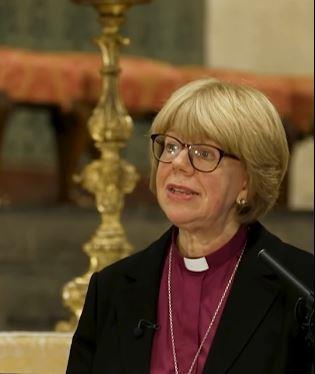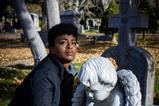Joy Roxborough reflects on the historic appointment of Bishop Sarah Mullally as the first female Archbishop of Canterbury. She considers what the milestone means for church leadership, inclusivity, and the example of Christ’s upside down kingdom.

Last week the Anglican Church made history with the appointment of the first female Archbishop of Canterbury since Augustine’s appointment in 597—more than 1,400 years ago—when the post was first created. The Rt Revd and Rt Hon Dame Sarah Mullally, current Bishop of London and a former Chief Nursing Officer for the UK, will become the 106th Archbishop of Canterbury. She will occupy the most senior position in the Anglican Church, second to the King.
Global reactions to her appointment have been mixed with much of the discussions centring on the long debated issue - should women be allowed to hold leadership roles in the Church?
Justin Welby has resigned, could the next Archbishop of Canterbury be a woman?
Although it should never be our intention to govern the Church by the world’s standards, I think it is accepted good leadership practice that an organisation ought to have diverse representation as a way of fostering inclusivity. Therefore, it stands to reason that women ought not to be marginalised in Church leadership roles.
As with most churches worldwide, the membership of the Anglican Church is predominantly female
As with most churches worldwide, the membership of the Anglican Church is predominantly female. A Tearfund report (2020) suggested that generally, 65% of church members are women, while only 35% are men. This is even more reason that I think women ought not to be marginalised in Church, an organisation where they constitute a majority.
‘I would welcome a female archbishop’
Everyone has an innate desire for a sense of belonging. As a woman on the outside of the Anglican Church looking in, I would find it difficult to feel a part of a body where I was excluded from ordinary activities just because I was a woman. I think its fair to say that Jesus was not big on titles or acquiring power. He made it clear that those who wanted to be great ought to seek to take the lowly positions of servanthood (Matt. 20:26; Lk. 22:26).
Furthermore, in all his interactions with women, Jesus elevated them as people and also used them in major ways to perform important leadership activities
Furthermore, in all his interactions with women, Jesus elevated them as people and also used them in major ways to perform important leadership activities, despite them not holding man-made titles. Consider the woman in Mark 5 who had been bleeding for 12 years. Jesus did not allow her to creep away in shame but called her out and publicly elevated her to the position of daughter (v 34). Now, that is a position that—hands down—would trump the position of Archbishop of anything any day!
And there is Mary Magdalene who had the honour of delivering to the disciples the most important news in all Scripture that Jesus had, beyond the shadow of doubt, risen from death (John 20:16-18). Finally, there is Gal. 3:28 that breaks down any lingering barriers that marks women off from men: “…there is neither male nor female;…you are all one in Christ Jesus.”
Reflections from a female ordinand on Sarah Mullally’s historic appointment
Although I am a woman, I don’t have a personal axe to grind in this debate because if I were an Anglican member, I would eventually vote with my feet. Nevertheless, I believe that Bishop Sarah’s appointment is a fair representation of God’s upside down Kingdom.
In her Canterbury speech, after the announcement of her nomination, Bishop Sarah’s servant heart shone through as she spoke of how washing feet was a key component of her previous roles as nurse, priest and bishop. I couldn’t help but imagine that, like Jesus, the new Archbishop of Canterbury would not hesitate to wrap a towel around her waist and kneel to wash some dirty feet if the need arose.
Her humility also shone when she admitted that the Anglican Church was guilty of errors in upholding safeguarding. This came with her commitment to accountability and to confront the dynamics of power as it plays out in such issues. Her commitment to inclusivity was also evident in the choice of the young boy, Noah, who read the closing prayer following her address.
As she acknowledged in her address, the new role is expected to be ‘challenging’ and ‘complex’. So, whatever views one may have regarding the appointment of the first female Archbishop of Canterbury, I think it would show our own commitment to the upside down kingdom if we decided to pray for Bishop Sarah as she prepares to begin her assignment officially in March.




































1 Reader's comment